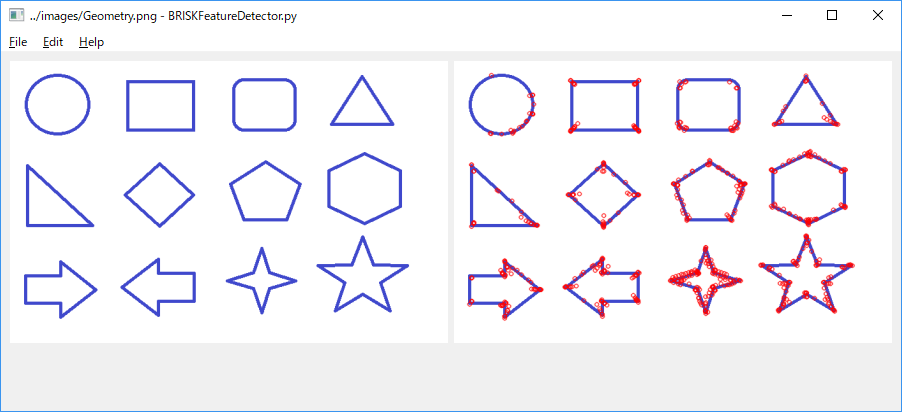|
SOL4Py Sample: BRISKFeatureDetector
|

#******************************************************************************
#
# Copyright (c) 2018-2019 Antillia.com TOSHIYUKI ARAI. ALL RIGHTS RESERVED.
#
# This program is free software: you can redistribute it and/or modify
# it under the terms of the GNU General Public License as published by
# the Free Software Foundation, either version 3 of the License, or
# (at your option) any later version.
#
# This program is distributed in the hope that it will be useful,
# but WITHOUT ANY WARRANTY; without even the implied warranty of
# MERCHANTABILITY or FITNESS FOR A PARTICULAR PURPOSE. See the
# GNU General Public License for more details.
#
# You should have received a copy of the GNU General Public License
# along with this program. If not, see <http://www.gnu.org/licenses/>.
#
#******************************************************************************
# BRISKFeatureDetector.py
# encodig: utf-8
import sys
import os
import cv2
import traceback
from PyQt5.QtCore import *
from PyQt5.QtWidgets import *
from PyQt5.QtGui import *
#
sys.path.append('../')
from SOL4Py.ZApplicationView import *
from SOL4Py.ZLabeledComboBox import ZLabeledComboBox
from SOL4Py.ZLabeledSlider import ZLabeledSlider
from SOL4Py.opencv.ZOpenCVImageView import ZOpenCVImageView
class MainView(ZApplicationView):
# Inner classes
#--------------------------------------------
class SourceImageView(ZOpenCVImageView):
def __init__(self, parent):
ZOpenCVImageView.__init__(self, parent)
def load(self, filename):
self.load_opencv_image(filename)
self.update()
class DetectedImageView(ZOpenCVImageView):
def __init__(self, parent):
ZOpenCVImageView.__init__(self, parent)
def load(self, filename):
self.load_opencv_image(filename)
def detect(self):
src_image = self.get_opencv_image()
if src_image.all() != None:
detector = cv2.BRISK_create()
keypoints = detector.detect(src_image)
detected_image = cv2.drawKeypoints(src_image, keypoints, None, color=(0, 0, 255),)
self.set_opencv_image(detected_image)
self.update()
#--------------------------------------------
# MainView Constructor
def __init__(self, title, x, y, width, height):
super(MainView, self).__init__(title, x, y, width, height)
filename = "../images/Geometry.png"
# 1 Create first imageview.
self.source_image_view = self.SourceImageView(self)
# 2 Create second imageview.
self.detected_image_view = self.DetectedImageView(self)
# 3 Load the file
self.load_file(filename)
# 3 Add imageviews to the main_layout which is a horizontal layouter.
self.add(self.source_image_view)
self.add(self.detected_image_view)
self.show()
def file_open(self):
options = QFileDialog.Options()
filename, _ = QFileDialog.getOpenFileName(self,"FileOpenDialog", "",
"All Files (*);;Image Files (*.png;*jpg;*.jpeg)", options=options)
if filename:
self.load_file(filename)
def load_file(self, filename):
self.source_image_view.load (filename)
self.detected_image_view.load(filename)
# Apply detect method to the detected image view.
self.detected_image_view.detect()
self.set_filenamed_title(filename)
#*************************************************
#
if main(__name__):
try:
app_name = os.path.basename(sys.argv[0])
applet = QApplication(sys.argv)
main_view = MainView(app_name, 40, 40, 900, 380)
main_view.show ()
applet.exec_()
except:
traceback.print_exc()
Last modified: 22 Mar. 2019
